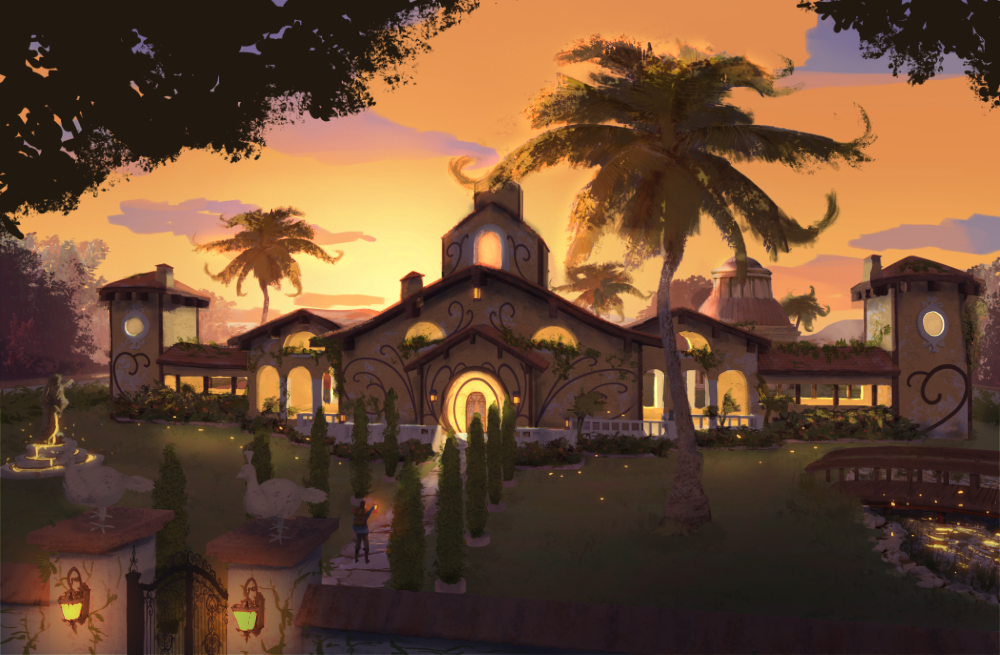At some stage in their fantasy roleplaying career, seasoned adventurers have seen so many taverns – rented the rooms, hoisted the ales, arm-wrestled the bullies, fought the brawls – they’ve plumbed the range of the Inn Experience. They’re bored with night watches, bored with barkeeps and grizzled lunatic barflies with treasure maps, bored with shady strangers watching them from the corner booth. They’re done dealing with dull domiciling.
Now, novice roleplayers should make camp. They should stand watch. When the characters explore a new wilderness, yes, show them its dangers. When the adventure calls for sacrifice and privation, inflict that. If the players expect an epic experience, lean into it. Frodo and Sam, scrambling across Mordor toward Mount Doom, didn’t while away the nights in a posh Gorgoroth motel. Ick! Nobody wants that.
But experienced players have already played through the wilderness thing, the watch thing, the inn thing. Their last party of player characters topped out at 14th level, and they owned a castle; now here they are back at 4th, with new PCs pitching hammocks and listening for bandits in the dark. After two or three or ten campaigns, a midnight attack becomes a nuisance. At that advanced stage, players with a long history and a knockabout temperament just want to wave their hand and bam: a good meal, a comfortable bed, and unbroken sleep. Recover spells, recharge hit dice, and get on with the adventure.
And when the night’s lodging becomes just a checkbox — well, why not make it nice? Even magnificent?
Manse Magnificent: A fantasy of prosperity
At some stage of the campaign when the DM tires of running campsite battles, a party of player characters (level 4+) can find a Cornerstone, a wondrous arcane item that conjures a personal safe house just for them. From then on, the PCs explore a new, ever-broadening experience of splendid living. The hearth levels up in tandem with the party, from tiny hut to cabin to villa and onward to astral stronghold. At each level, the hearth grants the PCs new comforts, new wonders, and new paths to adventure, without affecting the characters’ situation in their campaign world. And the hearth provides new tools the Dungeon Master can use to inform, guide, and challenge the party.
By making the lofty indulgences of the 7th-level magnificent mansion spell accessible to your low-level characters, Manse Magnificent furnishes your FRPG campaign in lavish luxury without breaking the game. After a day of sword-swinging and spellcasting, characters can kick back, dine in style, and sleep safely – and that’s all. They’re not rich or impressive or influential – not tougher or better equipped – they’re just well-fed, rested, and (here’s the point) having fun. Exchanging the un-fun logistics of “who stands watch when” for the new downtime activity of “what environment suits us best,” your group optimizes not for character safety, as such, but for player satisfaction.
You may ask, What if the heroes never want to leave? At low levels they can’t hold onto their plush home for more than a night. Later, to expand their mansion and gain new benefits, they must adventure in the outer world. Over time, their quest to develop their hearth can become a parallel almost-campaign, a way to enliven downtime. Meanwhile, the DM can use the mansion’s story devices to convey information or foreshadow conflict.
And if they don’t want to leave – well, is that so bad? The house of fantasy roleplaying has many mansions; your players’ wish-fulfillment desires may encompass more than battle and plunder. For twenty-something doomers who foresee a future of landlords, bosses, dead-end jobs, political turmoil, and a world on fire, a safe night’s sleep in a spacious and abundant sanctuary sounds as bewitching as a dragon’s lair of gold.
Wish you had a Cornerstone?
Join our mailing list and become part of the Interplanar Architects’ Community today!

